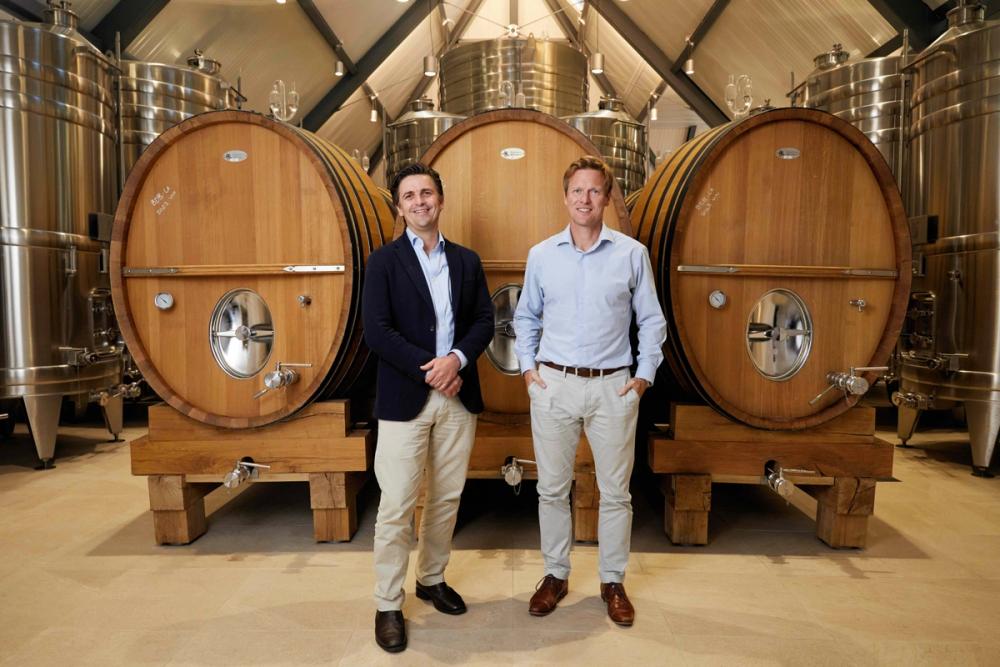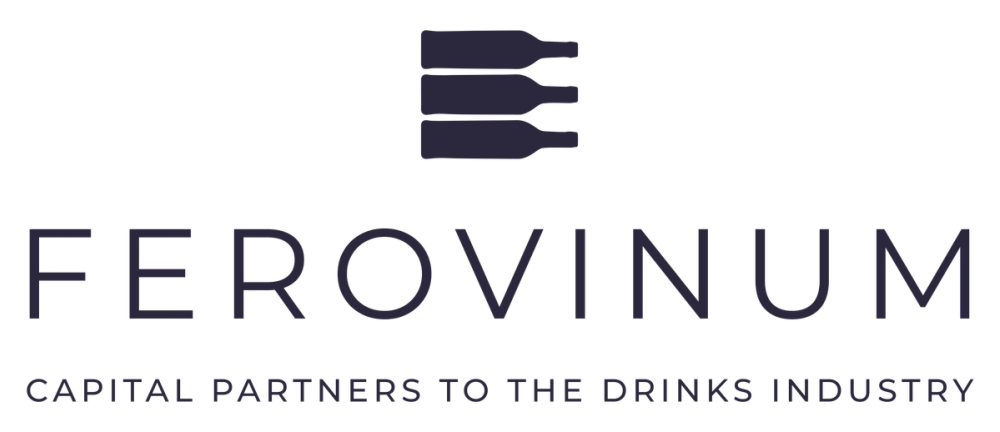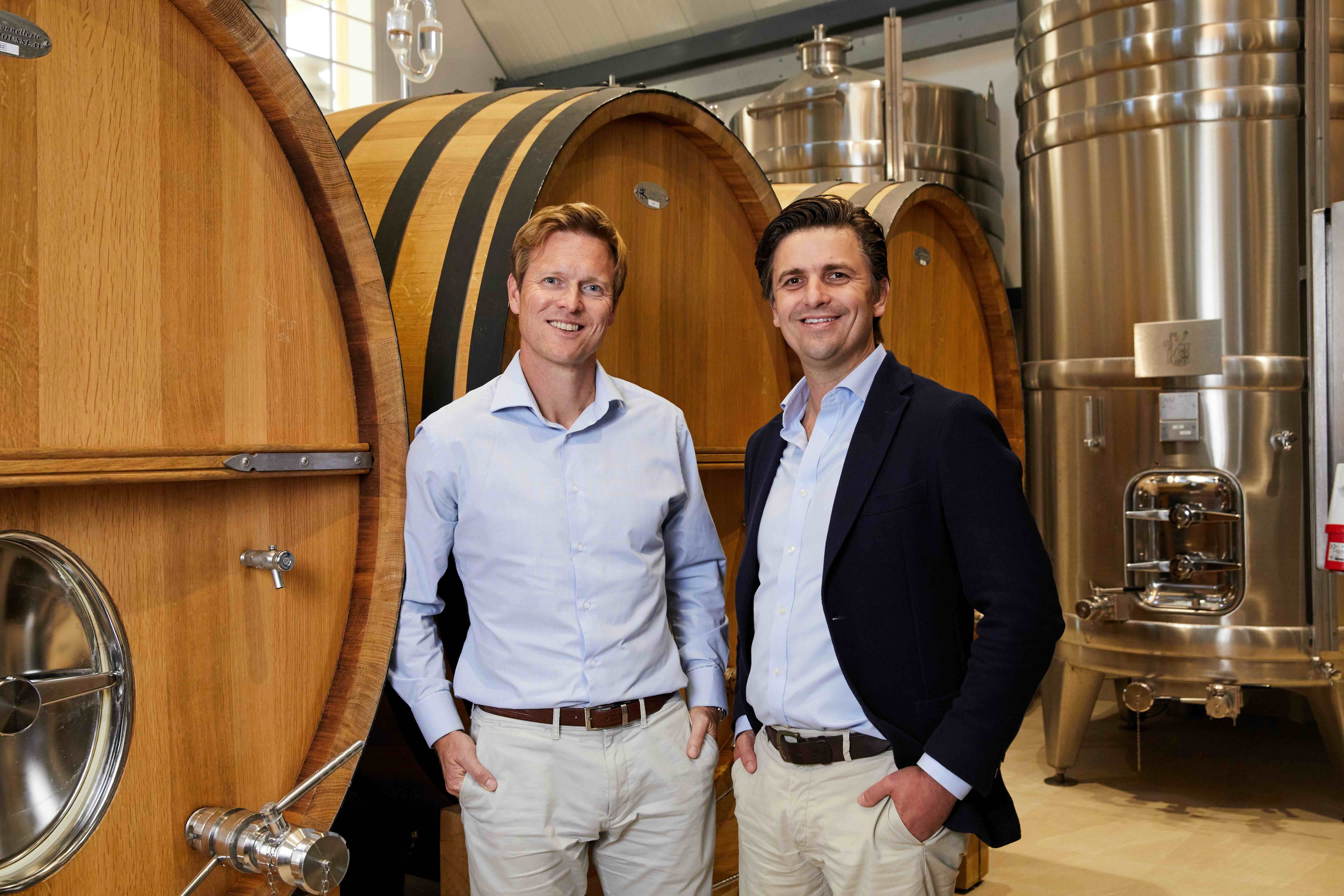Being able to bring an asset-backed securitisation fund of $550m into the drinks industry does not happen unless you are deeply embedded in how the capital markets work.
It’s why there has not been a business like Ferovinum in the drinks industry before. For this is not a company that has born out of the drinks industry, but the result of finance and capital experts in the banking sector identifying the enormous opportunity there is to modernise and transform largely dysfunctional supply chains and operational models compared to what is happening in most other food, beverage and retail sectors in the world, says Ferovinum co-founder and chief executive, Mitch Fowler.

Ferovinum's Mitch Fowler and Dan Gibney are looking to bring their extensive experiences and contacts from the world of high finance to provide a level of support and funding the drinks industry has not seen before
This level of financial investment, he adds, has not been made available to the drinks industry on this scale before because of its “complexity and fragmentation.”
What funding there has been available was reserved only to a select few and limited in scope, can come at a high cost of lending and does not have the flexibility that drinks companies need, he adds.
“We take what is a very complex underlying industry and wrap it up into a risk-managed product that our capital markets partners, banks and credit funds can deploy capital through,” explains Fowler. “It means we can access a much larger scale of capital than any individual one of our clients would have access to.”
“That drives lower costs and is more risk-managed and sustainable for the banks that we partner with and it is a better overall outcome for the industry as well.”
Industry first
Which brings us to the $550m securitisation program funding it has just secured from Pollen Street Capital and a leading investment bank.
“That deal is a perfect example. It is the first for the industry,” says Fowler.
It is also a “milestone” for the Ferovinum platform and the scale and level of “maturity” it has got to and means it can “unlock” a much larger scale of capital markets.
The significance of the $550m securitisation program is that it is the same type of investment that commercial mortgages are based on and introduces a pool of liquidity that Ferovinum can use to “scale to tens of billions of dollars”.
“It’s a really important milestone for us because it means across the entire industry there is no-one we can’t service now. We have that scale of infrastructure behind us in terms of access to capital,” explains Fowler. “We are pretty excited about that.”

Noticeably it was Ferovinum’s “deep knowledge of the drinks industry and a clear understanding of the needs of their customers” that convinced Pollen Street Capital to participate in such a landmark “asset-backed finance” program.
International growth
Crucially it is also international capital, stresses Ferovinum co-founder and chief financial officer, Dan Gibney, which allows its UK clients to build their business in their export markets and deal in different currencies.
It also enables Ferovinum to expand its platform and work with drinks businesses in the US, Europe and, later this year, Australia so that its clients can benefit from global supply chain efficiencies.
Fowler explains: “We have been exporting to the US and Europe for our UK clients, but this new deal will allow us to service clients in the US, Europe and Australia.”
Ferovinum sees the funding as potentially “game-changing” for the US domestic drinks market and will also enable American operators to expand their exports and build their international markets.
It is also looking to establish “significant storage hubs” in California, Florida, New Jersey and Texas to help drive the US business.
It already has offices in Miami, Houston and Sydney and the new funding will allow it to really scale up its international satellite divisions.
The Australian market is particularly interesting, says Fowler, in that whilst it is a major exporting country of wine, it is also a significant importer of all types of drinks products and it is looking to build a similar supply chain procurement, operational and sales platform that is has in the UK for Australian retailers and distributors to plug in too.
The capital program also takes Ferovinum out of just wine and spirits and will allow it to work with all beverage categories, including no and low alcoholic drinks.
Different industry mind sets

Ferovinum's Dan Gibney says its challenge is to get drinks companies to look at financing in a different way and to be seen as a positive rather than a negative
Gibney says it has been interesting for them to see how different distributors, in particular, have responded to the Ferovinum model. Often the initial response from some of the major players when they are being offered additional capital is to be “quite defensive” and say “we don’t need cash”.
“But when people realise we are basically improving their operations and their procurement can be more efficient and their cost per unit would be reduced then there is more interest,” he adds.
Whereas the response from the UK’s own producer network has been far more open. Ferovinum has been able to build strong partnerships with a number of English wine producers and Scotch whisky distillers that regularly have “working capital demands” thanks to the “long maturation process” of the drinks they are making and the demands they have to increase sales and consumer demand for them.
“They seem to be far more willing to talk about finance. Capital is always more front of mind when you have so many assets like the land, the winery, your buildings etc,” he adds. “It is seen as something that can breed success when you have got a growth industry. So English wine producers are more willing to talk about using us, whereas the distributors who were using us, were not talking about us,” says Fowler.
Fowler is confident the services Ferovinum offer will become more relevant to a wider cross section of businesses right across the drinks industry – particularly those companies “that have focused on being as efficient as possible”.
“The industry is so dependent on payment terms, particularly in the trade. So when capital is part of your proposition there are two things that companies are worrying about. If I am using this to access money is that some kind of admission that I have got a problem? Whereas the innovators look at it as a way to make my business more efficient, more healthy and can help fund my growth.”
He adds: “It is just a different mindset. Whereas some of the more established businesses might think you need to have a problem in order to have a conversation about capital efficiency, and this might be seen as a negative and could be somehow dangerous to their business. Which is absolutely the opposite of what we are trying to do, the businesses we work with improve profitability, reduce risk and increase growth.”
Scaling growth

Ferovinum's Mitch Fowler says it is particularly well placed to help businesses with turnvover pushing £100m to go to the next level through its funding and tech support solutions
Fowler and Gibney also hope the new securitisation funding will put them on a different footing with the giant drinks multinationals like Diageo and Pernod Ricard who they are already working with to some extent, but would like to do more.
“We buy from some of the majors already, but where I think we can be helpful to them is optimising specific channels especially for export," says Fowler. "Down the line the more integrated we get the more opportunities there are for us to help consolidate flows into different territories and different accounts. So I think we can add value to the majors. We are not actively seeking that business, but there are some really exciting things we can do for larger brand owners.”
Instead they see their main area of business coming from companies that have £10m to £100m in turnover but with the financial foundations to seek out much bigger deals as and when the right opportunities come up.
Tackling industry issues
Ferovinum also believes it is ideally placed to tackle the big potentially costly administrative challenges that have been thrown at the drinks industry like the new ABV-driven alcohol duty system and the roll out of the EPR packaging regulations.
“The duty change was an opportunity for us to show how quickly we can implement change,” says Fowler. “It was a calculation change in our code base. We have a bunch of math PhDs working for us so that type of thing can be done over a weekend, whereas an individual business is relying on their software provider running updates, if they have software, and if they don’t they are in-house having to manage all those changes manually.”
He also says it is “very well placed” to be able to handle the roll out of EPR due to its scale, control of its own proprietary systems and software engineering capability it has within the business and it will be more straightforward to manage once we know what the actual regulations are going to look like.
Commercially neutral

Ferovinum is looking to use its central London base - just off Carnaby Street - with its own roof terrace and new dedicated bar and conference facility - to invite customers and potential partners to host events and meetings there
Fowler and Gibney are also keen to explain that as a business Ferovinum is looking to build a “piece of infrastructure for the whole industry” and in order to do that well it has to remain “commercially neutral”.
So, for example, it is looking to “build an efficient set of rails” into the on and off-trades so it does not matter if you are any of the major on-trade distributors, be it Bibendum, Enotria&Coe, Hallgarten, Liberty etc. Those businesses can still compete as before, says Fowler, “it’s just restaurants [or major retailers] know the wine is coming in on an efficient set of rails with the most efficient fulfilment and best in class delivery” service.
Fowler explains: “It means any of our users are absolutely best in class when it comes to the logistical fulfilment side of their business, and the capital efficiency they get means they are operating at the best possible margins. If you put those two things together the businesses are not just able to grow, but they are healthier and more profitable too.”
For example, it has been able to fast track itself into being one of the top five suppliers to one of the UK’s major national on-trade distributors in terms of service levels and efficiency because it has multiple of its customers all servicing them through the Ferovinum platform which meant “automatically that national account starts aggregating and unlocking efficiencies” which meant “all the suppliers benefited from that”.
The more businesses and operators that use the Ferovinum platform for their fulfilment the more efficient it is for everyone in the supply chain, he claims.
* To find out more about how Ferovinum and how it works go to its website here.
* Ferovinum is a commercial partner to The Buyer.






























